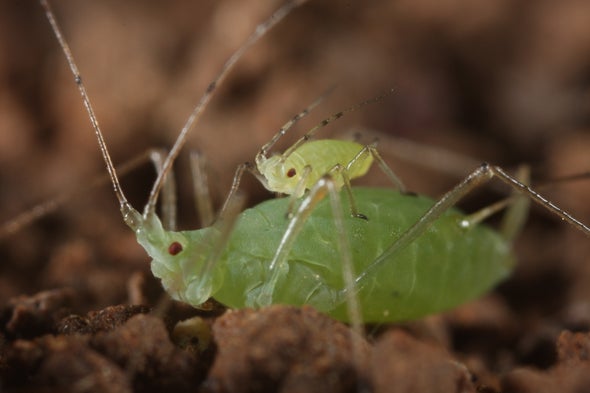(单词翻译:单击)
听力文本
This is Scientific American's 60-second Science, I'm Jason Goldman.
Imagine you're an aphid, a tiny insect that sucks plant sap for a living. You're munching away when a cow comes along to munch on the same plant you're on. You feel its warm breath. So you drop to the ground to avoid being eaten and run away.
The ground is a scary place for an aphid, but it's better than a cow's mouth. But if you're an especially small, young aphid, also known as a nymph, scampering over cracks, stones and twigs is really difficult.
Luckily, young aphids have a solution. They climb aboard the back of a larger aphid that's also making an escape and hitch a ride, cowboy style.
"Sometimes there's a pile of nymphs at the beginning that climb on the adult, sometimes even eight or nine nymphs that all climb on the adult."
University of Haifa entomologist Moshe Gish.
Thanks to a series of experiments, Gish learned that the nymphs actively seek out adults after dropping to the ground. It's not that they just try to climb onto any old thing they find nearby.
For the adults, the nymphs are a bit of a nuisance.
"There is some disadvantage for the adult. It slows it down."

The grownups try to toss off their riders, like a mechanical bull at a college bar. And they'll toss off a relative just the same as they will an unrelated nymph. But somehow, evolution has allowed this piggyback riding behavior to persist.
"Probably the cost that the adult pays for that delay is not high enough to balance the benefit that the colony gets from saving a few nymphs."
In other words, the advantage to the younger bugs outweighs the cost imposed on the older ones. The entire colony benefits. The results are in the journal Frontiers in Zoology.
Aphids are some of agriculture's most important pests, but to Gish they are also a part of a fascinating, important ecosystem.
"Most people think of aphids — if we think of aphids — they think of aphids as tiny dots on their plants that kill off their plants. But there's a whole world there...all the interactions with the host plants and there's a chemical warfare between aphids and their host plants. It's coevolution and it's an arms race. There's a lot of action going on between the aphids and the plants, and the aphids and their predators, and the aphids and the elements. It's a whole world."
Thanks for listening for Scientific American — 60-Second Science. I'm Jason Goldman.
参考译文
这里是科学美国人——60秒科学系列,我是杰森·古德曼。
想象你是一只蚜虫——一种以吸食植物汁液为生的小昆虫。你正在津津有味地咀嚼时,突然过来一头牛要吃掉你所在的那株植物。你感觉到了牛的温热气息。所以为了避免被吃掉,你赶紧跳到地上逃跑了。
对蚜虫来说,地面是个可怕的地方,但好过牛的嘴巴。不过如果你是一只特别小的年幼蚜虫,即幼虫,那要跳过裂缝、石头和树枝就很难了。
幸运的是,小蚜虫找到了解决方法。它们爬到同样在逃命的大蚜虫背上,像牛仔那样搭便车。
“有时一开始会有一堆小蚜虫爬到成年蚜虫背上,有时甚至有八九只。”
海法大学的昆虫学家摩西·吉什说到。
经过一系列实验,吉什了解到,蚜虫幼虫落到地面后会主动寻找成年蚜虫。也就是说,蚜虫幼虫不会随便在附近找个成年蚜虫就爬到其背上去。
对成年蚜虫来说,蚜虫幼虫有点讨厌。
“这对成年蚜虫来说有些不利。因为幼虫会减慢它们的速度。”
成年蚜虫会努力把幼虫甩下来,就像大学酒吧里的机械牛一样。即便蚜虫幼虫是自己的亲戚,它们也会像甩掉和自己不相干的幼虫那样将其甩下来。但不知为何,进化让这种背驮式骑行延续了下来。
“很可能是因为,成年蚜虫为耽误逃命时间所付出的代价,不足以平衡种群保存几只幼虫所获得的益处。”
换句话说,年幼蚜虫的利益大于成年蚜虫的损失。这是整个种群的获益。研究结果发表在《动物学前沿》期刊上。
蚜虫是农业中最重要的害虫之一,但对吉什来说,蚜虫也是迷人且重要的生态系统的一部分。
“大多数人想到蚜虫时——如果我们会想到蚜虫的话——都会将它们视为杀死植物的小点。但那里存在一个完整的系统,有蚜虫与宿主植物之间的所有互动,还有蚜虫与宿主植物之间展开的化学战争。这是二者的共同进化,也是一场军备竞赛。蚜虫和植物、蚜虫与捕食者以及蚜虫与自然环境之间存在大量活动。这是个完整的世界。”
谢谢大家收听科学美国人——60秒科学。我是杰森·古德曼。
译文为可可英语翻译,未经授权请勿转载!
重点讲解
重点讲解:
1. run away 离开;逃离;躲开;
I can't stand any more. I'm going to run away.
我再也受不了了。我要逃走。
2. hitch a ride 搭便车(旅行);搭顺风车;
They hitched a ride in a truck.
他们搭乘了一辆路过的货车。
3. seek out 寻找到;找出;
Ellen spent the day in the hills and sought me out when she returned.
埃伦在山里呆了一整天,并于回来后找到了我。
4. kill off 毁灭;破坏;扼杀;使停止;
It is an effective treatment for the bacteria and does kill it off.
这是杀菌的特效药,能将其全部消灭。


